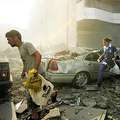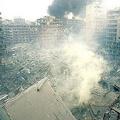 世界衛生組織(WHO)18日指出,在以色列攻擊之下,黎巴嫩的醫療照護、飲用水、衛生設備及其他衛生必需品均極度匱乏,聯合國人道事務機構已加快腳步,準備整合區域層級的行動以因應此危機。「慢性病患及傷者的醫療照護管道,是需要關切的問題。」
世界衛生組織(WHO)18日指出,在以色列攻擊之下,黎巴嫩的醫療照護、飲用水、衛生設備及其他衛生必需品均極度匱乏,聯合國人道事務機構已加快腳步,準備整合區域層級的行動以因應此危機。「慢性病患及傷者的醫療照護管道,是需要關切的問題。」
世界衛生組織還指出,供電系統受損也限制了水資源和公共衛生服務;另外也必須確保難民的糧食、收容和醫療服務。
聯合國人道事務協調辦公室的訊息指出,據黎巴嫩當局估計,以色列的攻擊行動造成全國約65,000人失去家園,且難民主要集中在貝魯特和黎巴嫩北部。.
國際紅十字會駐貝魯特發言人哈珊(Hicham Hassan)指出:「以色列的轟炸行動越來越猛烈,現在情勢更加艱難,幾乎無法獲得可靠的訊息。」他說:「人們孤立無援,南方各村莊已成孤島,與外界完全斷絕聯繫。」
世界衛生組織說,相關單位都已投入。聯合國兒童基金會(UNICEF)正準備醫療急救箱、家庭衛生工具、水箱、淨水材料、發電機和燃料等物資,即將運送到黎巴嫩;世界糧食計劃署(WFP)也為難民準備了25,000公噸的餅乾。
聯合國兒童基金會18日發表了一份黎巴嫩情勢評估報告,指該國的人道情勢迅速惡化中。據估計,戰事已導致200多位黎巴嫩平民死亡、400多人受傷──其中大約30 %是兒童。武裝衝突導致機場、道路、發電廠、橋樑和加油站遭到破壞,基本民生物資運送系統瓦解。
聯合國兒童基金會發出呼籲,希望募集730萬美元款項,以支應未來4 個月直到2006年11月18日的急迫性需求。該機構指出,此金額中最多會運用290萬美元支應水和衛生需要,健康和營養照護則須240萬美元,而剩餘將用作維安、後勤、社會心理重建、教育、電信和行政開銷。
 With access to medical care, water, sanitation and other heath necessities in Lebanon severely limited by Israeli attacks, United Nations humanitarian agencies have stepped up preparations for a coordinated, regional response to the crisis, the World Health Organization (WHO) said today. "Access to health care for injured and patients with chronic conditions is a major concern."
With access to medical care, water, sanitation and other heath necessities in Lebanon severely limited by Israeli attacks, United Nations humanitarian agencies have stepped up preparations for a coordinated, regional response to the crisis, the World Health Organization (WHO) said today. "Access to health care for injured and patients with chronic conditions is a major concern."
In addition, the world health agency said that impaired power supplies have limited water and sanitation services, and that food, shelter and health services must be ensured for the displaced population.
The number of people displaced countrywide due to ongoing Israeli attacks has been estimated by the government at 65,000, with most seeking shelter in Beirut and in the north of the country, according to the UN Office for the Coordination of Humanitarian Affairs - Integrated Regional Information Networks.
"It's now a more difficult situation because bombing has increased and there's little information available," said Hicham Hassan, spokesman for the International Committee of the Red Cross in Beirut. "People are stranded and villages in the south are isolated from one another and the rest of the country."
In the event they are needed, the UN Children's Fund (UNICEF) has prepared emergency health kits, family hygiene kits and water tanks, water purification material, generators and fuel to be sent to Lebanon, while WFP has made available 25,000 tons of biscuits for the displaced population, WHO said.
In a situation report, UNICEF said today that the humanitarian situation in Lebanon is rapidly deteriorating. The conflict is estimated to have killed over 200 Lebanese civilians and wounded more than 400 – approximately 30 percent of whom are children. It has destroyed airports, roads, power plants, bridges, and fuel stations, disrupting the delivery of vital social services.
UNICEF is asking for donations of US$7.3 million to cover their immediate needs over the coming four months through November 18, 2006. Of this sum, the largest amount, US$2.9 million will be needed for water and sanitation, US$ 2.4 million for health and nutrition, while the remainder will be spent for security and logistics, psycho-social, education, telecommunications and administrative needs.


